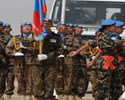
This guest post by Joe Read of Physicians for Human Rights originally appeared on the PHR blog.
Next week, the U.N. Secretary-General’s report on the future of the United Nations Mission in the Central African Republic and Chad peacekeeping force, or MINURCAT, in eastern Chad will be released, outlining the withdrawal of peacekeeping troops in the Chad-Sudan border region visited by PHR researchers in 2008. The report "Nowhere to Turn: Failure to Protect, Support and Assure Justice for Darfuri Women," released by PHR in June 2009, outlined urgent human rights issues in eastern Chad, including food insecurity, camp infrastructure, access to health and psychosocial care, and security for refugee families. Among the disturbing findings of our investigation was a 50 percent rate of rape or sexual assault reported by women interviewed by the PHR medical team.
Since the time of PHR’s investigation, a number of security threats and human rights issues have been recorded — via international media reporting on hijackings and kidnappings of humanitarian aid workers, and reports such as that released by the Institute of Studies on Conflicts and Humanitarian Action on the continued need for the peacekeeping force.
Many large-scale infrastructure issues remain, such as the weak Chadian legal system, drought and food shortage, and the continued operation of militarized rebel groups in the area, as well as auxiliary practical issues such as low phone coverage (a key issue for reducing attacks against refugees and humanitarians, as emergency phone calls allow for MINURCAT forces to be alerted to security problems). The recent dispute over the continued presence of the MINURCAT force has detracted focus from these problems, which need to remain at the forefront of the diplomatic and humanitarian agenda in Chad. (Despite ongoing needs in eastern Chad, the Chadian government opposed the MINURCAT mission’s renewal in January 2010.)
The withdrawal of MINURCAT transfers responsibility for the security of refugees and humanitarian operations to the Government of Chad — a significant challenge for a state with low material wealth and incomplete infrastructure. So, what can be done, given the limitations of the current circumstances?
First, it is important to remember that the continued existence of the 200,000 Darfurian refugees in eastern Chad relies on the efforts of humanitarian aid workers and U.N. staff on the ground: managing the refugee camps, distributing WFP rations and shelter items, and providing emergency medical care. Humanitarian agencies have continued to operate in eastern Chad despite increasingly frequent security threats to NGOs and personnel, and rely on police escorts in order to operate in the Phase IV security environment. The current system of police escorts for NGO convoys must be taken over by the Chadian police force, and it is particularly important that NGOs are not obliged to pay or provide other compensation for the new security arrangements, and that the Chadian government accept responsibility for ensuring the security of the humanitarian operations.
Secondly, refugee communities and the humanitarian actors working with refugees must be consulted and kept informed of the transition and departure of MINURCAT and how the government will continue MINURCAT’s security and protection activities. In order to ensure this takes place, the government should immediately establish a dialogue and consultation forum with refugee communities and humanitarian workers, and the international community should remain engaged in the transition process to ensure that this takes place.
Thirdly, it is of utmost importance that the MINURCAT withdrawal not be allowed to disrupt the humanitarian operations in eastern Chad and/or detract from refugee security and protection. The continued monitoring of the human rights situation on the ground, and a specific focus on the security and protection needs of refugees, is paramount. The numbers of the civilian police force should be increased as the military component is phased out, and measures must be taken in the recruiting process to improve the conduct of police officers, sensitize police to human rights and gender issues, and dramatically raise the number of women police officers.
The disappointing withdrawal of the MINURCAT force — before the benchmarks of withdrawal have been met (see the Secretary-General’s December 2008 reports) — should not distract the U.N. Security Council or the international community from addressing the ongoing problems affecting the Darfurian refugee population in eastern Chad. The reduction of arms, sexual and gender-based violence and human rights abuses (demilitarization of camps) must remain a key priority, along with assisting the voluntary and safe return of communities. In addition to resolving security issues on a community level, it is vital that widespread problems, such as the capacity and training of national law enforcement agencies, judiciary and prison systems, are addressed, and that the Chadian military assigns a quick reaction force to take over from MINURCAT’s civilian component.
Photo: MINURCAT peacekeepers (minurcat.unmissions.org)

